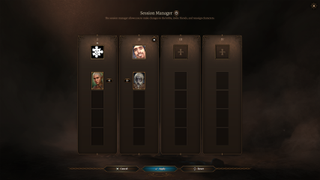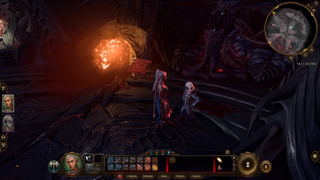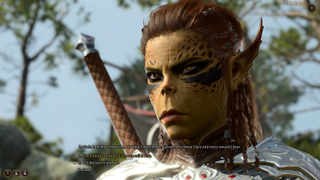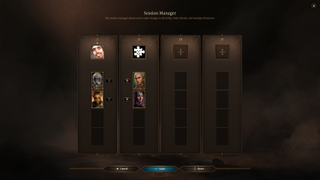How to play Baldur's Gate 3 multiplayer, and whether or not you should
How to set up, save, and resume a multiplayer game, and the pros and cons of Baldur's Gate 3 co-op.

Baldur's Gate 3 features 2-4 player co-op, but it isn't one of those games where multiplayer is obviously the better way to play—it's just a different way. At least for my first time through the full game, I intend to play it as a singleplayer RPG, but I've also tested out the co-op and the unpredictability it introduces makes it tempting.
Here's how Baldur's Gate 3 multiplayer works (it might not be how you expect), how to start a co-op campaign, and the pros and cons from my perspective.
How multiplayer works
Multiplayer in Baldur's Gate 3 doesn't work like it does in a lot of modern games, where players drop in and drop out of each other's worlds with characters that they retain control of. Characters in Baldur's Gate 3 are tied to campaign save files, not player accounts. A campaign's most recent save file is like the table where your D&D group meets, with all your character sheets preserved from your last session. To continue the campaign, the campaign host has to load that save file, invite everyone to the table, and sit them in front of their sheets.
Once in the game, Baldur's Gate 3 co-op players can more or less do their own things. If one player starts a conversation with an NPC, the other players can watch it and suggest dialogue options by clicking on them, but whoever initiated the dialogue (or was the target of it, if they wandered into a room and triggered an event) makes the decisions. Control of NPC companions in the party is assigned to players in the Session menu. (See the romance section below for more on co-op and NPCs.)
Co-op players can also wander away from each other and do totally different things. One player can even be in a turn-based battle while another is exploring on the other side of the map.
Note: If continuing a co-op campaign alone, you'll have to control the other player characters yourself. Originally, there was no way to remove those characters from your party, but as of Patch 2, Withers' Wardrobe of Wayward Friends allows you to dismiss co-op party members if you want to replace them with NPC companions.
How to play Baldur's Gate 3 multiplayer
Starting a multiplayer campaign: To start a fresh Baldur's Gate 3 campaign in co-op, hit the "Multiplayer" button from the main menu. From there, select "Create" at the bottom of the screen to make a lobby. Now you can click on the empty player boxes to invite players from your Steam friends list, or set the lobby to Public to allow anyone to join.
PC Gamer Newsletter
Sign up to get the best content of the week, and great gaming deals, as picked by the editors.
Alternatively, you can send the Server ID to friends, and they can use it with the Direct Connect option from the Multiplayer screen. Players who bought Baldur's Gate 3 on GOG need this.
When you start the game, everyone who's connected will be sent to the character creation screen, and then awaken together at the beginning of the campaign. This is the only way for players other than the host to select Origin characters. Anyone who joins mid-campaign has to make a custom character.
Continuing a multiplayer campaign: To pick up where you left off in co-op, the host player must load the campaign's most recent save file and invite the players from the "Session" menu (press Escape to find it). The host can then assign the characters to their players.

Inviting new players to an existing campaign: If you invite a player to an existing campaign with no player characters for them to control, they'll be prompted to make a new custom character. (They cannot select an Origin character.) When they're done, their character will be added to the party, sending one of your companions back to camp if your party is full. The new character will be granted levels to get them up to the host's level.
Reminder: If you invite a friend to your campaign and then continue solo later, their character will remain in your party. As of Patch 2, it is possible to dismiss co-op party members.
What happens if a player disconnects or isn't available? When you're missing a player, control of their character can be assigned to another player in the Session menu.
Can you switch hosts? Yes, with a little effort. Only the host can save the campaign progress, and so only the host can load it back up to start a new session—unless they give the save file to someone else. I found my Baldur's Gate 3 save files stashed away in Windows' hidden AppData folder:
Users > [username] > AppData > Local > Larian Studios > Baldur's Gate 3 > PlayerProfiles > Public > Savegames > Story
I sent a co-op save file to another player, who was able to load it and then invite me to the session. We were also able to reassign characters in the Session menu so that I could keep playing as the character I made when I initiated the co-op campaign.

Should you play Baldur's Gate 3 multiplayer?
For games like Borderlands 3 or Remnant 2, the question of whether or not to play multiplayer has a definitive answer in my opinion: yes, you should, because it's just more fun. Baldur's Gate 3 isn't like that. After trying both and listening to the experiences of others, neither co-op nor singleplayer are obviously better in my view. Here are the pros and cons of Baldur's Gate 3 co-op as I see them:
The pros of Baldur's Gate 3 co-op:
- Managing a full party alone is a lot of work: You're playing four D&D characters at once. Dividing responsibilities among a co-op group lets you focus on just your character's build and actions.
- The sandbox freedom may create opportunities for real bonding, or at least comedy, like the kind experienced around a real tabletop RPG session. Phil Iwaniuk played both Larian's Divinity: Original Sin and Original Sin 2 with a friend, and said that "the uniquely combative nature of co-op in Divinity is the best thing about it."
The cons of Baldur's Gate 3 co-op:
- It will probably take a long time to finish the campaign, unless you have very efficient friends who never goof off and are always available to play when you are.
- It can be distracting: You will see your friends jogging around in the back of your dramatic dialogue scenes.
- Friends can make decisions that alter the course of the campaign in ways you don't like. If you want it to be your story, you might want to play alone the first time.
- You can't romance played Origin characters, and although you'll be able to interact with NPC companions in camp (including romantically), you might not be able to include them in your party, depending on how many players you have and their preferences.
If you're leaning toward singleplayer but are worried you'll miss out by not playing co-op, my recommendation is to trust your gut and go for a singleplayer playthrough. It's a lot to manage, and co-op might turn out to be a great experience, but you can always start a new co-op campaign after you've gotten your fill of the story at your preferred pace and with your preferred decisions.
Romance in multiplayer

Co-op players can't romance each other (well, not in the game, at least), even if one or both of them are playing Origin characters. "Our relationship system is designed for romancing NPCs only," Larian has said.
When it comes to co-op players romancing NPCs, things get a little complicated. If a companion NPC is in your party, it will be assigned to a player in the Session menu. That player can control the companion and initiate dialogue scenes with them, while other players can't—they'll just rebuff any attempt to speak with them.
NPCs who hang out in your camp but aren't in the party, however, can be chatted up by any player. I haven't yet attempted to have two players romance the same NPC, but there's no obvious feature preventing it.

If you don't want your co-op partners to know what you're getting up to with NPCs, you can keep them out of your little chats. By default, romance scenes are hidden from other players, and any dialogue scene can be hidden by clicking a checkbox in the lower left side of the screen.
If you do want to bare it all, you can check "Share Private Moments" in the gameplay options menu to show every scene your character is involved in by default. You can still hide them case-by-case if you do this. See our Baldur's Gate 3 romance guide for more on the game's opportunities for love, or just a good time.

Tyler grew up in Silicon Valley during the '80s and '90s, playing games like Zork and Arkanoid on early PCs. He was later captivated by Myst, SimCity, Civilization, Command & Conquer, all the shooters they call "boomer shooters" now, and PS1 classic Bushido Blade (that's right: he had Bleem!). Tyler joined PC Gamer in 2011, and today he's focused on the site's news coverage. His hobbies include amateur boxing and adding to his 1,200-plus hours in Rocket League.

Baldur's Gate 3 player summons roughly 88 minions to conquer Honour Mode with a glorious army of spore zombies, elementals, and Scratch the best boy

Baldur's Gate 3 fans are discussing what coffee each character would order, and reckon Astarion would be demanding an 'iced venti oat milk latte with cold foam' topped with 2 pumps of hazelnut
Most Popular

